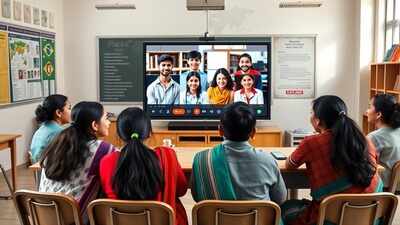ARTICLE AD BOX

Transforming education: 5 reasons behind the boom in virtual exchange programs for global learning (Image: Pexels)
Imagine classrooms where your child studies and competes with peers across the globe, solving real-world problems and exploring diverse cultures but all from the comfort of home.
Virtual exchange programs have already made that future a reality, where these globally connected classrooms are more than just a temporary fix. They are transforming students' learning, empathy and growth, without ever requiring a passport.Virtual exchange programs are redefining what it means to learn globally in an era when flights may be grounded but curiosity never is. Children and students everywhere now have access to a richer, more inclusive education, without the need for a passport and can collaborate for cross-border, meaningful storytelling or real-world problem-solving sessions.
1. Building empathy across borders and sharing experiences
Embedding Critical Thinking in Global Virtual Exchange—Teaching Sociology Across National Borders in Virtual Classrooms, a study that was published in Sustainability, 2022, explored how virtual exchange allows students to share personal experiences ranging from Covid-19 lockdowns to cultural family norms, without the need for travel. These cross-border interactions foster critical thinking, global awareness and inclusive access to intercultural learning, especially for students with limited mobility or resources.

Virtual exchange programs are just a budget-friendly alternative to study abroad (Image: TOI)
Students are able to gain a valuable perspective on the world through this type of experiential and culturally grounded dialogue, which are conducted virtually and asynchronously and remove the need for travel. For example, marginalised students were able to take advantage of global exchange opportunities without having to pay a lot of money.
2. Short virtual courses for improving cultural competence
According to the findings of the AFS Global You Virtual Exchange Impact Study (2021), even five-week virtual exchanges significantly improved students' global competence. The participants showed:
- Nearly 3x more positive growth with the capacity to avoid judging unfamiliar cultures
- Around a 2-fold increase in overall intercultural effectiveness, enhancing their capacity to build respectful relationships across cultures.
3. Tailored interactions, especially potent for students with less experience
The Impact of Virtual Exchange on College Students in the US and China, a study published in Scientific Reports in 2022, examined a 10-week virtual exchange program between Chinese and American college students where Chinese participants who were initially less confident on the global stage, showed larger shifts in career direction and openness.
On the other hand, US students became measurably more inclusive. The study demonstrated how, depending on where they started, virtual exchange benefits each group in distinct and significant ways.
4. Learning with real-world importance through virtual health projects
At Stanford, a virtual exchange in global health connected students from the US and Lebanon for a compelling six-week project. Using Contact Theory and Problem-Based Learning, the participating students created real-world solutions for refugee communities in mixed-country teams.
This digital collaborative model transcended traditional boundaries and created socially responsible engagement that extended well beyond academic drills.
5. Utilising Virtual Mobility to increase access, equity and equality
Virtual Student Mobility (VSM) is defined as an international academic exchange facilitated by ICT in a report published in 2024 by UNESCO. Researchers discovered that VSM makes global learning truly borderless by providing inclusive access for students who are unable to travel due to financial, health, or logistical constraints.
VSM programs also support transformative intercultural learning in addition to (but not in place of) conventional study abroad experiences.

Can virtual exchange programs replace traditional global learning experiences?
Cultural empathy during virtual exchange helps students in recognising a variety of perspectives and global issues while structured interactions foster global competence attitudes, awareness and communication. It promises personal growth as education tailored to different starting profiles — building confidence, inclusivity and global vision expands equity in international education while removing travel or financial barriers.



.png)
.png)
.png)
















 13 hours ago
4
13 hours ago
4










 English (US) ·
English (US) ·